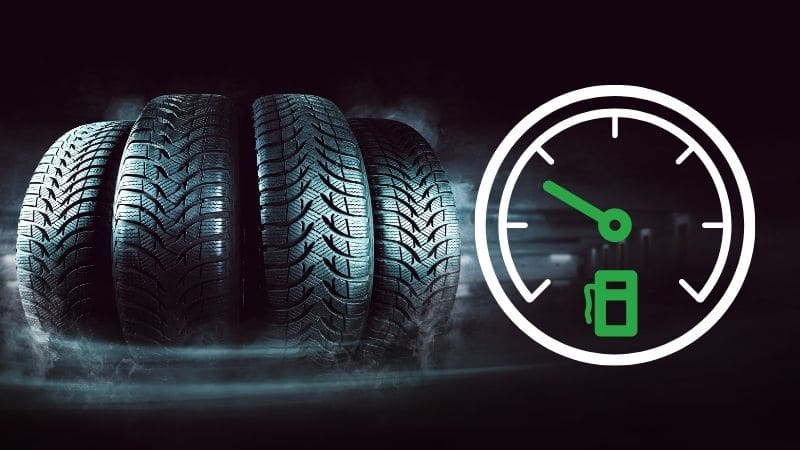Did you know that your tires are one of the things that affect your gas mileage?
Well, vehicle tires affect everything from acceleration and braking to handling, and even gas mileage.
As a matter of fact, many tire manufacturers are now designing tires with a fuel efficiency rating. So, do not just go for any tire available on the market.
If you think fuel efficiency is important, then this post is for you!
Read on to learn more about how the tires you choose can affect your gas mileage as well as a discussion about whether or not fuel efficient tires are worth getting.
5 Tire Factors That Affect Gas Mileage
Several aspects of a tire can affect your car’s gas mileage. At first sight, the tires of your vehicle may not seem like they can have any effect at all on your fuel efficiency.
However, according to how well you maintain them and their size, they play a significant role in how efficiently your vehicle performs.
Let’s look at several tire aspects and their effects on gas mileage.
1. Tire Size and Gas Mileage
Small tires require less energy in order to start moving. This is because they weigh less and they also cause less friction or rolling resistance compared to larger tires.
So for gas mileage optimization, if you’re driving with many starts and stops, such as in the city, smaller tires are better.
That said, larger tires are more fuel efficient during highway driving, where frequent accelerations is not an issue. The reason for this is that larger tires expose your engine to less work, producing lower RPMs at higher speeds compared to smaller tires.
Most drivers prefer changing the tire size on their cars, but the vehicle manufacturer in your manual recommends the best wheels for maximum fuel mileage, so do your best to follow those recomendations if fuel efficiency is your thing.
2. Tire Tread and Gas Mileage
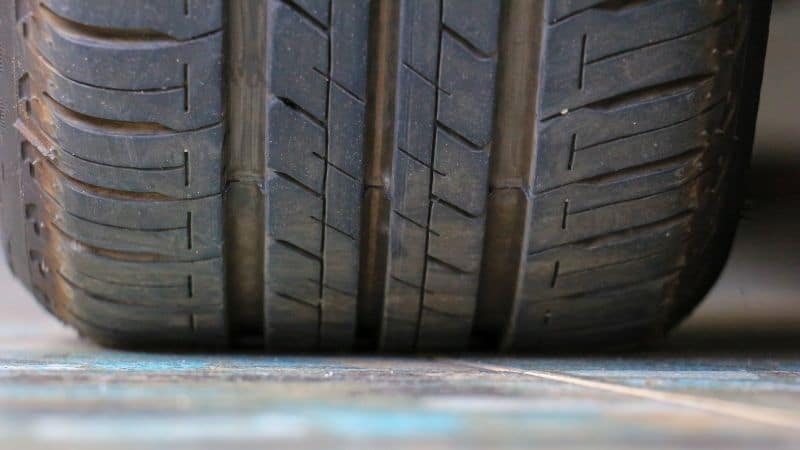
Tire tread is another crucial tire aspect that affects your gas mileage. The tread helps your car tires grab the surface in inclement weather and if you need to brake suddenly.
Racing car drivers use bald wheels known as “slicks” as the absence of treads enhances fuel economy and increases speed. However, enough tread is important for daily driving.
On the other side of the tread spectrum is knobby, chunky, off-road treads. They have wicked-looking treads that have the ability to claw through the fudgiest mud. These tires will reduce your fuel economy noticeably.
So, unless you have to spend much of your time on off-road surfaces, it’s a good idea to exchange the off-road treads for conventional tires to improve your gas mileage.
3. Wheel Type and Gas Mileage
If you are after customizing your tires or thinking of changing the size of your tires, do not go for steel rims, go for light-alloy rims as they are way more fuel efficient because they’re lighter in weight.
You should also consider the weight of your car and whether or not you carry loads as tires have a given load capacity.
Consider the size of the tire that can fit the wheels well. It won’t be a wise idea if your lighter wheel needs a wider tire that can cause more rolling resistance, however. Remember that if your new wheels require the tires to have a shorter sidewall, it will reduce the load capacity of your vehicle.
You can improve your gas mileage by having the best tire and wheel package for your car. It is wise to consult with your mechanic before changing your stock equipment.
4. Air Pressure and Gas Mileage
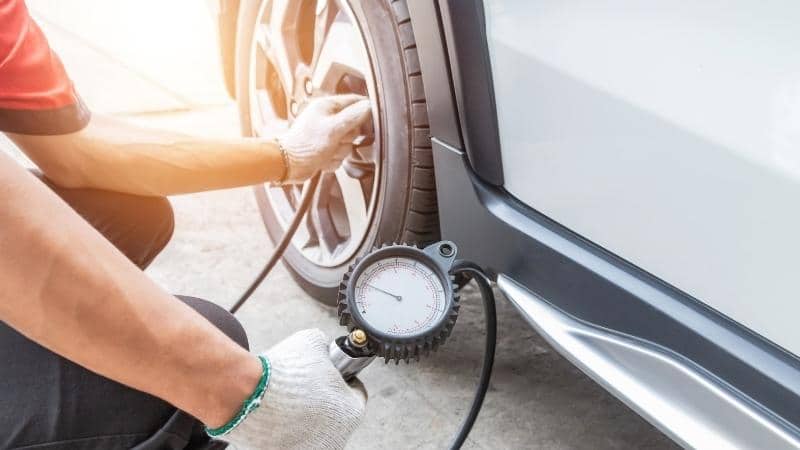
Tires deflated by 7 psi may raise rolling resistance by about 20% drastically increasing your fuel consumption. Inspect your tires for the correct air pressure on a weekly basis.
Manufacturers’ specifications are always seen on the outer wall of your tires. Therefore, follow those guidelines anytime you fill your tires.
5. Tire Weight and Gas Mileage
Large tires will reduce your fuel economy due to their weight. This means that they have higher rolling resistance which will require more effort from the engine to keep them rolling.
However as stated earlier, having larger tires will improve your car’s fuel efficiency if you are a high-speed driver.
Does The Tire Type Affect Gas Mileage?
Different tire aspects have different effects on gas mileage. Below are some tire aspects that will significantly affect your vehicle’s gas mileage.
Winter Tires and Gas Mileage
Winter tires improve handling, maneuverability, and traction on wet roads, thus reducing the engine’s workload. This will help conserve fuel and improve gas mileage. With that said, if you use winter tires during the hot seasons, they will make your car work tediously and decrease fuel efficiency.
All-Terrain Tires and Gas Mileage
Best fuel-efficient tires are well designed to lower the amount of effort needed for your vehicle tires to keep rolling.
Low rolling resistance tires will save you money at the filling station by reducing the overall fuel consumption. However, all-terrain tires cannot provide the same fuel efficiency as passenger vehicle tires, but they don’t increase fuel consumption like their mud-terrain counterparts do.
Aggressive all-terrain tires do not have the same tread pattern as highway tires, which implies they will offer the best grip on the road. Likewise, all-terrain tires offer more excellent rolling resistance than pavement-bound cousins. Thus providing a more significant impact on fuel economy.
The conclusion is that all-terrain tires increase fuel consumption by about 3% compared to using highway tires.
Do New Tires Reduce or Increase Gas Mileage?
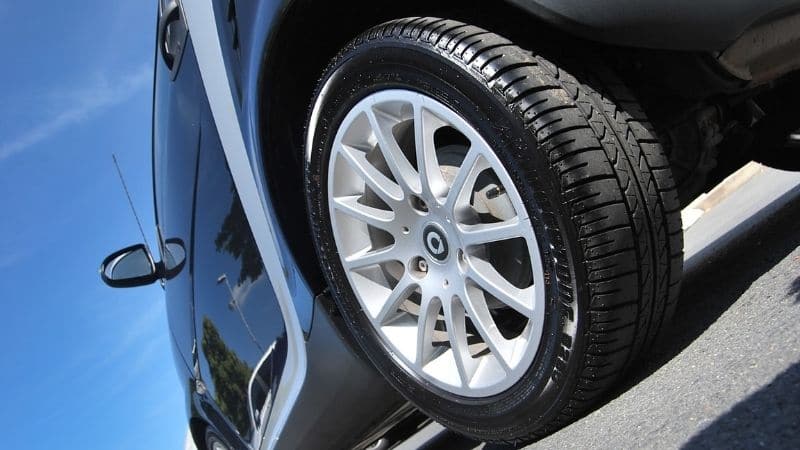
Believe it or not, the reality is that most new tires will affect your gas mileage in a negative way.
Yes you heard that right! Your gas mileage will drop. This is due to the full tread provided by the new tires. The full tread will have higher rolling resistance compared to the old or well-used tires you ahd on your car previously, hence affecting your vehicle’s fuel economy.
I wrote more in-depth about the fact that new tires often reduce gas mileage in this post.
Are Fuel-Efficient Tires Worth Getting?
If you are looking at improving your vehicle’s fuel economy, fuel-efficient tires are the best option. Infact, they are becoming must-haves for most vehicle owners globally.
In fact, the United States Department of Energy Research reveals that using tires made specifically to be fuel-efficient, you can save more than 8% of your fuel compared to using regular tires.
Other Factors Impacting Gas Mileage
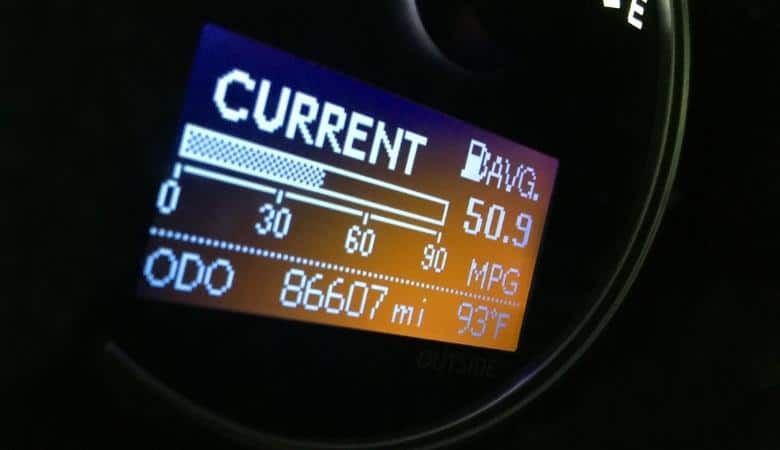
Even though fuel-efficient tires can help improve your gas mileage, what improves your gas mileage the most however, is the way you drive.
Together with your vehicle’s tires, there are a number of other factors that can affect your fuel economy, including:
Driving at Highway Speeds: Driving your vehicle at high speeds will increase aerodynamic drag, lowering fuel consumption.
Frequent Short Trips: Your vehicle will operate at a lower percentage of time at its maximum temperature if you use it frequently for short trips.
Excessive Idling: If your car idles for long, it may lead to declined fuel economy.
Cold Weather: Your vehicle’s engine cannot work at peak levels till it warms up. This can take longer to work in cold weather.
Using Four-Wheel Drive: Driving your car in a four-wheel-drive model will expose it to more energy to arrive at your final destination.
Operating Electrical Accessories: Switching on your vehicle’s heat or A/C reduces fuel consumption.
Driving on Mountains/Hills: Driving on mountainous terrain, hills, or unpaved roads will decrease fuel economy compared to driving on flat roads.
To be precise, the amount of fuel you can save with fuel-efficient tires differ based on the design and type of the tire plus the factors mentioned above.
However, if you research more on fuel-efficient tires available, you will realize that tires can help increase your vehicle’s fuel economy.
Tire Maintenance For Optimal Fuel Economy
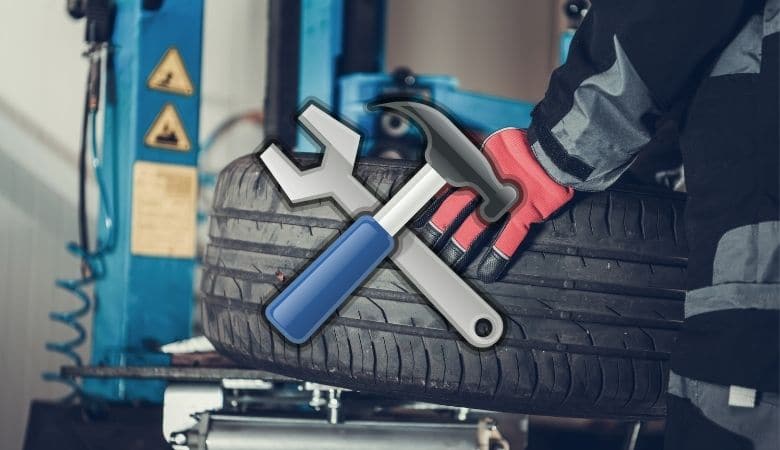
1. Ensure Your Tires Are Inflated
Ensuring that your tires are well inflated is always a wise decision in proper tire maintenance. Adequately inflated tires will help improve your fuel efficiency up to 3%.
You can check your car’s correct tire pressure level in the manual. Ensure to check your tire pressure anytime you fuel your car or at least once per week.
2. Keep Your Tires Aligned
Tire alignment ensures your tires are driving straight and true. Misaligned tires lead to uneven tread wear and poor traction. This will make your tires drag instead of rolling, which may decrease fuel efficiency.
3. Rotate and Balance Your Tires Regularly
Having your tires rotated and balanced regularly will help save you gas mileage. Also, rotating your tires will reduce uneven tread wear, making your tires last longer.
The uneven wear increases your tire’s rolling resistance, lowering your miles per gallon. You should have your tires rotated as per the manufacturer’s recommendations, or anytime you get an oil change.
Final Verdict
Since it is a desire for every car owner to spend the least on fuel, it is essential to consider tires that will help you achieve such. Different tires will have different fuel consumption rates, but this guide can help do the needful to cut down fuel costs in the long run.
Hi, my name is Niklas, the head content creator & CEO of Whirling Wheelz. I am very interested in vehicles of all kinds, mainly cars. I have a car mechanics degree from high school and a big hobby of mine is to follow the WRC (World Rally Championship) both online and through travel.

